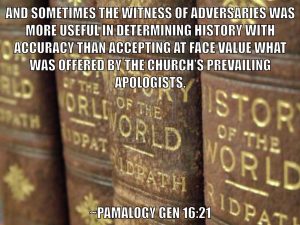XVI
Simon the magician
1Now before the Clementine literature was written, Luke, who was a physician by trade, accompanied the apostle Paul on some of his evangelical journeys and wrote down some of the details in a work sacred to most Christians titled Acts. 2And in chapter eight of his Acts of the apostles he included a story of a certain sorcerer named Simon, who was from Samaria and making himself out to be someone great.

3And according to Luke, the people said of the magician, this man is what is called the great power of God. 4But when the disciple of Jesus, Philip, performed many miracles, Simon believed, was baptized and was amazed at the signs and miracles that followed Philip. 5Further, Luke wrote, when the apostles in Jerusalem heard that Samaria heard the word of God, they sent Peter and John, who prayed for them that they might receive the Holy Spirit since they had been baptized.
6And according to Luke, Simon wished to possess the same authority of conveying the Holy Spirit on those on whom he laid his hands as the apostles did and offered them money. 7But Peter did not respond as Simon expected. He instead issued a harsh judgement, saying,
8“May your silver perish with you, because you thought you could obtain the gift of God with money! 9You have no part or portion in this matter, for your heart is not right before God. 10Therefore repent of this wickedness of yours, and pray the Lord that, if possible, the intention of your heart may be forgiven you. 11For I see that you are in the gall of bitterness and in the bondage of iniquity.”
12And according to Luke, Simon answered and said, “ Pray to the Lord for me yourselves, so that nothing of what you have said may come upon me.”
martyrdom of Peter
13And it came to pass that certain details concerning the martyrdom of Peter were mentioned by Christian writers of the second and third century CE in an increasing fashion, where one thing was said by one writer and then some embellishment by another afterwards. 14Thus in 180 CE Gaius mentioned a memorial to Peter on the Ostian way. 15And Tertullian added that he suffered the same way as his Lord in Rome, where Paul also was beheaded, implying that Peter was crucified. 16Then Origen added in 202 CE that Peter was crucified upside down. 17And just about that time a work in imitation of Luke’s Acts was published called the Acts of Peter.
18And the Acts of Peter, though ultimately rejected as a work of the heterodox following Docetus, explained more fully why Peter had requested to be crucified upside down. 19And it was believed because of the Gospel of John that Peter was led around blind before he was martyred but the copyist did not say more. 20But it had prompted commentary according to this expanding pattern. 21And sometimes the witness of adversaries was more useful in determining history with accuracy than accepting at face value what was offered by the church’s prevailing apologists.
22And behold: if it can be accepted as such, Peter himself had sent greetings in a first epistle attributed to him from Babylon on behalf of himself and his companion Marcus. 23And it was written to Pontus, Galatia, Cappadocia, Asia and Bithynia. 24And these cities were closer to Babylon than Rome but the Christians in Rome, assuming that Peter had journeyed there, concluded that when he said Babylon, he was referring to Rome. 25For Israel had been held captive by Babylon and was about to be held captive also by Rome. 26And Marcus was a Latin name.
27And it came to pass in the fourth century CE that the Emperor Constantine claimed to have found the bones of Peter along with many other significant relics. 28And the ossuary was kept buried beneath the Vatican. 29Therefore many continued to believe that Peter had reached Rome before his death. 30But despite such evidence, many came to doubt it was so. 31And then there were the Clementine romances.
evolution of Clementine romances
32Now the Clementine romances evolved into two forms, Homilies and Recognitions, having some portions in common and some unique. 33And some chapters called the Kyrigmou Petrou were the work of Ebionites in the late second century and both of the final works were copied by them into the works that were preserved.
34And the Ebionites rejected the writings of Paul and of Luke. 35And they believed that Jesus was the Messiah but did not believe he was the incarnate God. 36And the Ebionites also were deemed heretical by the self described orthodox church fathers beginning with Ireneus and Hippolytus. 37And these two surviving works, bearing witness to an earlier common source text and to oral tradition regarding Peter and Simon the magician, would verify that Peter and Clement were well acquainted in Rome. 38Only the Acts of Peter made out that these companions journeyed straight to Rome by boat while the Recognitions had them confronting Simon the magician in Caesaria on the way to Antioch.
Simonians
39Now Ireneus himself first elaborated on the teachings of Simon the magician, saying that after his encounter with Philip, Peter and John, the heretical group known as Simonians grew. 40And this had previously been attested to by Hegesippus. 41And Justin also, being familiar with Caesaria, said that many in Samaria were followers of a certain Simon of Gitta. 42And Justin also confused Ireneus by incorrectly asserting that Claudius Caesar set up a statue in Simon’s honor but Ireneus repeated the error. 43And verily, that statue still stands to this day, and it pays tribute to the Roman deity Semo Sancus rather than to Simon of Gitta.
44And expounding more on the teaching of the Simonians, Ireneus said that this Simon had appeared to the Jews as the Son of God but to the Samaritans as the Father. 45And Ireneus went on to describe the birth of angels by him and the continuance of his teaching by Menander, who was likewise from Samaria. 46But though mentioning Caesar and this statue, Ireneus said nothing of Simon encountering Peter again.
47And Hippolytus continued the teaching of Ireneus regarding the Simonians and expounded in much greater detail. 48And some of what Hippolytus related was like that which was given in the Acts of Peter, how Simon quoted from the Hebrew Scriptures and spoke of a hidden light and claimed to be divine. 49Yet Hippolytus did not validate or endorse the Acts of Peter. 50And neither Ireneus nor Hippolytus, for all their learning, showed any knowledge of the Clementine Homilies or Recognitions or even of the earlier Kyrigmou Petrou, when addressing the teaching of the Simonians.
< PGen Ch15<< || PGen Index|| >>PGen Ch17>>
